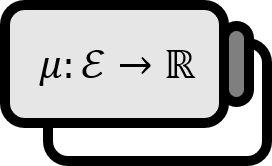Proof of Fatou's Lemma
Theorem 1
For a sequence $\left\{ f_{n} \right\}$ of non-negative measurable functions, $$ \int_{E} \left( \liminf_{n \to \infty} f_{n} \right) dm \le \liminf_{n \to \infty} \int_{E} f_{n} dm $$
- $\liminf$ is the limit inferior.
Explanation
A lemma necessary for proving the Monotone Convergence Theorem and the Dominated Convergence Theorem in real analysis. The version of Fatou’s lemma for series without the condition of being measurable functions is as follows.
Series Version: For a sequence $\left\{ f_{k} : \mathbb{N} \to [0, \infty) \right\}_{k \in \mathbb{N}}$ of functions with non-negative values $$ \sum_{j=1}^{\infty} \liminf_{k \to \infty} f_{k} (j) \le \liminf_{k \to \infty} \sum_{j=1}^{\infty} f_{k} (j) \qquad , \forall j \in \mathbb{N} $$
Proof
Strategy: It helps to have an intuition for simple functions. As with all lemmas, they are useful but the proof is quite long and complex, so it is best read when in a clear and healthy state of mind. The proof for the series case is essentially the same.
Part 1.
If we have $$ f : = \liminf_{n \to \infty} f_{n} \\ \displaystyle g_{n} : = \inf_{k \ge n } f_{k} $$ then $\displaystyle f = \lim_{n \to \infty} g_{n}$. $$ \int_{E} f dm \le \liminf_{n \to \infty} \int_{E} f_{n} dm $$ To show this, it’s sufficient to prove for all simple functions $\phi \le f$ that $$ \int_{E} \phi dm \le \liminf_{n \to \infty} \int_{E} f_{n} dm $$
Now, let’s define a new simple function for a very small positive number $\varepsilon > 0$. Then for a sufficiently large natural number $n$, $\phi_{\varepsilon} \le g_{n} \le f$ will hold. Lastly, if we define $A_{k} : = \left\{ x \ | \ g_{k} \ge \phi_{\varepsilon} \right\}$, $$ A_{k} \subset A_{k+1} \\ \displaystyle \bigcup_{k=1}^{\infty} A_{k} = \mathbb{R} $$
Part 2.
Since $A_{n}$ and $\phi_{\varepsilon} \le g_{n}$, $$ \int_{A_{n} \cap E} \phi_{\varepsilon} dm \le \int_{A_{n} \cap E} g_{n} dm $$ and since $\displaystyle g_{n} = \inf_{k \ge n } f_{k}$, from $k \ge n$, we have $$ \int_{A_{n} \cap E} g_{n} dm \le \int_{A_{n} \cap E} f_{k} dm $$ Meanwhile, since $A_{n} \cap E \subset E$, $$ \int_{A_{n} \cap E} f_{k} dm \le \int_{E} f_{k} dm $$ Hence, we obtain the following: $$ \int_{A_{n} \cap E} \phi_{\varepsilon} dm \le \liminf_{n \to \infty} \int_{E} f_{n} dm $$
Part 3.
Since $\phi_{\epsilon}$ was a simple function, its image can be represented as a finite set $\left\{ c_{1} , c_{2} , \cdots , c_{r} \right\}$. If we assume $B_{i} := \phi_{\epsilon}^{-1} ( \left\{ c_{i} \right\} )$, $$ \int_{A_{n} \cap E} \phi_{\varepsilon} dm = \sum_{i = 1}^{r} c_{i} m (A_{n} \cap E \cap B_{i}) $$
From Part 1, since $A_{n} \subset A_{n+1}$ and $\displaystyle \bigcup_{n=1}^{\infty} A_{n} = \mathbb{R}$, $$ \lim_{n \to \infty} \sum_{i = 1}^{r} c_{i} m (A_{n} \cap E \cap B_{i}) = \lim_{n \to \infty} \int_{A_{n} \cap E} \phi_{\varepsilon} dm = \int_{E} \phi_{\varepsilon} dm $$ Combining with results obtained in Part 2, $$ \int_{E} \phi_{\varepsilon} dm \le \liminf_{k \to \infty} \int_{E} f_{k} dm $$
Part 4.
Case 1. $m( \left\{ x \ | \ \phi (x) >0 \right\} ) < \infty$
$$\displaystyle \int_{E} \phi_{\varepsilon} dm = \int_{E} \phi dm - \varepsilon m( \left\{ x \ | \ \phi (x) >0 \right\} ) $$ Taking the limit as $\varepsilon \to 0$, yields the following: $$ \displaystyle \int_{E} \phi_{\varepsilon} dm = \int_{E} \phi dm $$Case 2. $m( \left\{ x \ | \ \phi (x) >0 \right\} ) = \infty$ $$\displaystyle D_{n} : = \left\{ x \ \left| \ g(x) \ge {{1} \over {2}} \min \left\{ c_{i} \right\}_{i=1}^{n} \right. \right\} $$ Then, $$ D_{n} \subset D_{n+1} \\ \displaystyle \bigcup_{n=1}^{\infty} D_{n} = \mathbb{R} $$ Since $\displaystyle \int_{D_{n} \cap E} g_{n} dm \to \infty$, and from the definition of $g_{n}$, we obtain the following: $$ \displaystyle \int_{D_{n} \cap E} g_{n} dm \le \int_{D_{n} \cap E} f_{k} dm \le \int_{E} f_{k} dm $$
Therefore, in any case, for all simple functions $\phi \le f$, the following holds: $$ \int_{E} \phi dm \le \liminf_{n \to \infty} \int_{E} f_{n} dm $$
■
Capinski. (1999). Measure, Integral and Probability: p82. ↩︎
